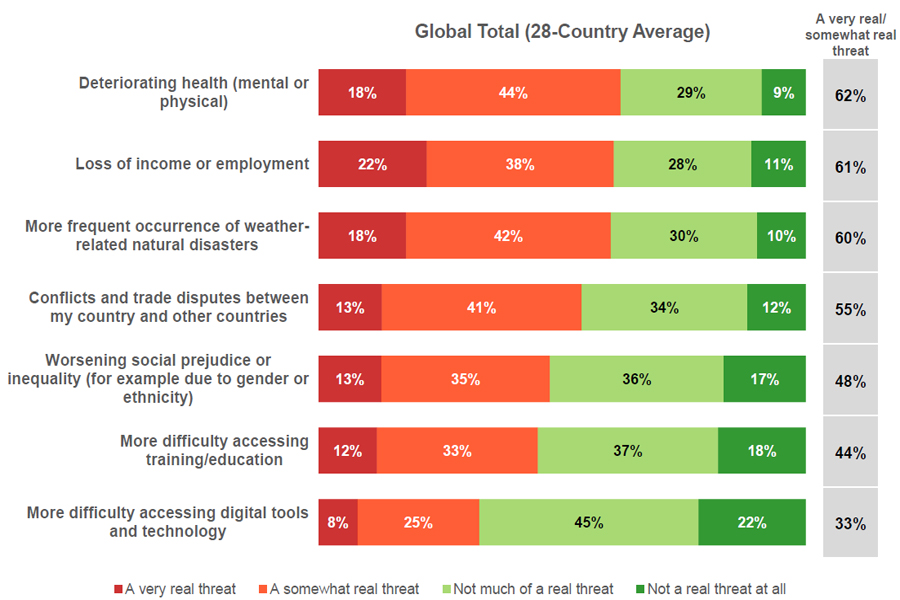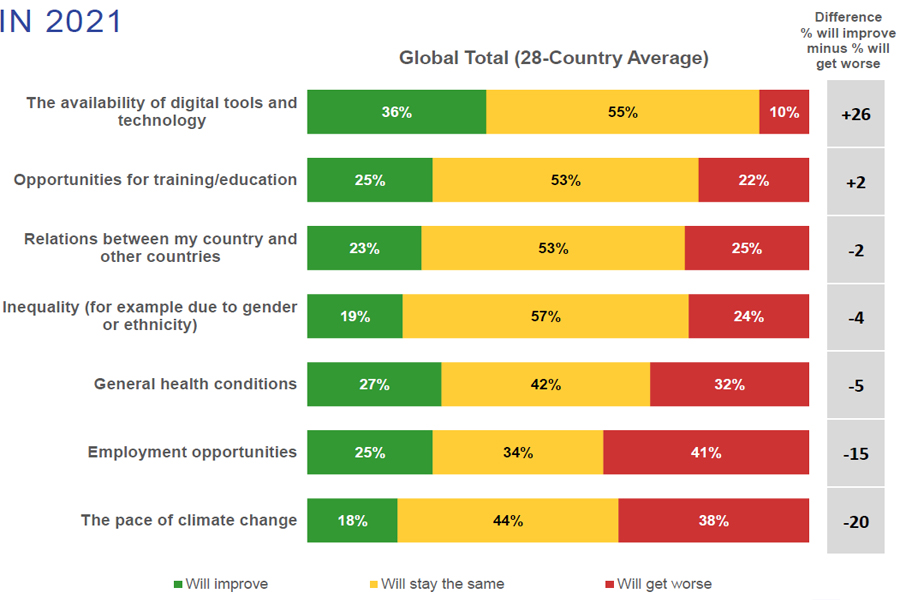Three out of every five adults around the world perceive deteriorating health, loss of income/employment and more frequent weather-related natural disasters to be a real threat this year, according to the latest World Economic Forum (WEF) and Ipsos survey.
Among the 23,004 citizens from 28 countries surveyed (between 23 December 2020 and 8 January 2021), more think the pace of climate change, employment opportunities and general health conditions will get worse this year, than improve.
TOP GLOBAL CONCERNS
When asked how real a threat they think each of seven possible developments is to them and their family in the next 12 months, 62% of adults globally say that “deteriorating health (mental or physical)” is a very or somewhat real threat, followed by a “loss of income or employment” for 61%, and “more frequent occurrence of weather-related natural disasters” for 60%. Other threats include:
- Conflicts and trade disputes between my country and other countries” (55%).
- Worsening social prejudice or inequality (48%).
- More difficulty accessing training/education (44%).
- More difficulty accessing digital tools and technology (33%).
Overall, however, two-thirds of global citizens are unconcerned about being able to access digital tools and technology, with only one in 10 expect it to be more challenging in 2021. Looking at each of the seven areas of concern, more adults globally expect five of them to get worse in 2021 than to improve. They include the pace of employment opportunities, health conditions, inequality (e.g. based on gender or ethnicity); relations between countries and climate change.

EMPLOYMENT & LIVELIHOOD WORRIES
Citizens in Chile (81%), Peru (80%) and Turkey (80%) are particularly fearful of losing their income or employment. At the other end of the spectrum, fewer than two in five feel threatened by job loss in the Netherlands (32%), Sweden (38%) and China (39%).
Only seven of the 28 countries expect employment opportunities to improve in 2021 than get worse, including Peru (by 42 points) and Saudi Arabia (39 points); the reverse is the case in 19 countries, most markedly in Japan (by 57 points), Great Britain (53 points) and France (50 points).
WOSENING PREJUDICE & INEQUALITY
The proportion of those who expect worsening social prejudice or inequality (for example due to gender or ethnicity) in the next 12 months is highest in Turkey (69%), South Africa (63%) and Chile (63%). It is lowest in Sweden (30%) and Russia (33%).
Only seven out of the 28 countries in the survey, believe inequality will improve in 2021. They include Saudi Arabia, Peru, and China. In contrast, pessimists about inequality outnumber optimists in 16 countries, especially in Hungary and Italy.
ACCESS TO TRAINING & EDUCATION
The prospect of having more difficulty accessing training/education is a real threat for citizens in Turkey (75%) and Peru (67%); and the least in Sweden (19%), the Netherlands (24%) and Australia (25%).
Significantly larger proportions of people expect opportunities for training and education to improve in 2021 than to get worse in 12 countries – most of all in Saudi Arabia (by 45 points), Peru (44 points), Mexico (36 points), and China (36 points). However, there are significantly more pessimists than there are optimists in 13 countries, especially in Hungary (by 29 points), Japan (24 points) and Great Britain (24 points).

DIGITAL TOOLS & TECHNOLOGY
Concern about having more difficulty accessing digital tools and technology is most widespread in Argentina (54%), India (52%), and South Korea (50%) and least so in Sweden (12%), Australia (18%), and Canada (19%). The percentage of people expecting the availability of digital tools and technology to improve in 2021 exceeds the percentage of those who think it will get worse in all countries surveyed.
This is most of all the case in Saudi Arabia (by 57 points), Peru (55 points), and India (48 points). Italy is the only country where, while the proportion of optimists is greater than that of pessimists.
CLIMATE & CONFLICTS
A more frequent occurrence of weather-related natural disasters is particularly likely to be perceived to be a threat in Chile (78), Spain (77%), and France (76%); and least so in Saudi Arabia (41%), Sweden (43%) and China (44%). Climate change pessimists outnumber optimists in 20 countries, most of all in Italy (by 51 points), Turkey (51 points) and France (50 points).
The two nations surveyed whose citizens most fear conflicts and trade disputes between their country and other countries include Turkey (76%) and Australia (69%). In contrast, fewer than four in 10 adults surveyed in Sweden (33%), Saudi Arabia (38%) and the Netherlands (39%) view international clashes and trade wars as a real threat for them and their family.
The percentage of those expecting relations between their country and other countries to improve in 2021 significantly exceeds the percentage of those who think they will get worse in 10 out of 28 countries surveyed, led by Saudi Arabia (by 48 points), Peru (47 points) and Mexico (38 points). In contrast, those who think their country’s international relations will get worse outnumber those who think they will improve in 14 countries, particularly in Australia (by 35 points), Great Britain (35 points), Hungary (34 points) and Poland (34 points).
RESETING PRIORITIES
These findings come as WEF’s Davos week begins, highlighting the importance of leaders across the public and private sectors coming together to address the changes needed in a crucial year ahead. The Davos Agenda will help leaders choose innovative and bold solutions to stem the pandemic and drive a robust recovery over the next year.
Commenting on the survey results, Professor Klaus Schwab, Founder and Executive Chairman of the World Economic Forum, stated: “In the context of the Covid-19 pandemic, the need to reset priorities and the urgency to reform systems have been growing stronger around the world. Rebuilding trust and increasing global cooperation are crucial to fostering innovative and bold solutions to stem the pandemic and drive a robust recovery. This unique meeting will be an opportunity for leaders to outline their vision and address the most important issues of our time, such as the need to accelerate job creation and to protect the environment.”








































